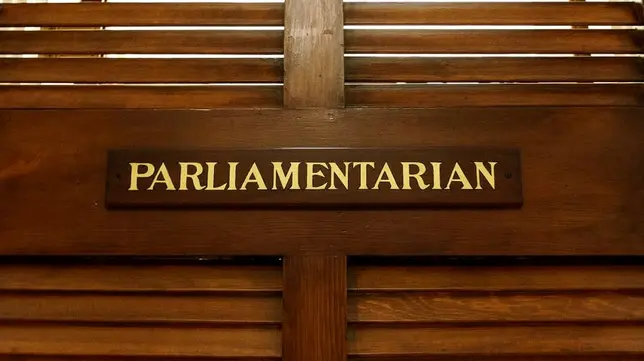When most Americans think about who controls legislation in Washington, they picture the President, the Speaker of the House, or the Senate Majority Leader. But one lesser-known figure—the Senate parliamentarian—often holds more sway over how laws are passed than the average citizen realizes.
With little public visibility and no voting power, the Senate parliamentarian might seem like a minor bureaucrat. Yet, their interpretations can make or break major policy efforts. From health care to immigration to taxes, their rulings have shifted the direction of federal legislation multiple times.
In this post, we’ll explore five surprising powers the Senate parliamentarian has, and why their influence deserves more attention.

Table of Contents
Who Is the Senate Parliamentarian?
The Senate parliamentarian is a nonpartisan advisor to the United States Senate, responsible for interpreting the body’s complex rules and procedures. Appointed by the Senate Majority Leader, the parliamentarian’s job is to ensure that legislation follows the chamber’s established norms, especially when it comes to contentious tactics like budget reconciliation.
While the position may seem behind-the-scenes, the person holding it can determine whether a bill survives the legislative process or dies before it ever reaches the floor.
1. They Decide What Can Be Passed via Budget Reconciliation
One of the senate parliamentarian’s most powerful tools is interpreting the rules of budget reconciliation, a fast-track legislative process that allows certain bills to pass with just 51 votes—bypassing the usual 60-vote filibuster requirement.
Reconciliation is supposed to be limited to tax, spending, and debt-limit measures. But over the years, lawmakers have tried to sneak policy reforms into this process. It’s the parliamentarian who decides whether these efforts meet the rules laid out in the Byrd Rule, named after Senator Robert Byrd.
In recent years, this rule has blocked attempts to include a $15 minimum wage and immigration reform in reconciliation bills. The senate parliamentarian’s interpretation can literally make or break historic legislation.
2. They Influence Which Amendments Are Allowed
During intense floor debates, senators often propose dozens or even hundreds of amendments to legislation. Not all of them are germane (relevant) or procedurally valid. That’s where the senate parliamentarian comes in.
They review each amendment and advise the presiding officer on whether it can be included in the debate. This gatekeeping role helps maintain order—and often curbs attempts to hijack a bill with unrelated political messaging.
3. They Shape the Content of Budget Bills
Because budget reconciliation is one of the few ways a Senate majority can pass legislation without bipartisan support, it’s become a go-to tool for ambitious agendas. The senate parliamentarian reviews every section of a reconciliation bill and can strike down provisions that stray from budgetary relevance.
For example, in 2021, the parliamentarian ruled that a proposed immigration provision did not meet reconciliation standards. Similarly, parts of past healthcare and tax bills were removed after parliamentary review.
This means that the parliamentarian has the unique power to shape the final content of legislation—even though they aren’t an elected official.
4. They Provide Daily Guidance Behind the Scenes
Every day the Senate is in session, the senate parliamentarian and their small team advise the presiding officer, typically a junior senator, on how to respond to procedural motions. While senators have the option to challenge these rulings, they almost never do—it would require a vote and break long-standing norms.
This gives the parliamentarian a de facto voice in how debates unfold, how votes are scheduled, and whether certain maneuvers are valid. It’s not glamorous, but it’s incredibly powerful.
5. They Can Become the Center of Political Controversy
Because of their behind-the-scenes authority, senate parliamentarians are occasionally thrust into political firestorms. When their rulings block a party’s key policy goal, calls to override, replace, or even fire them erupt.
For example, after the 2021 immigration ruling, some progressive lawmakers called for the parliamentarian to be overruled or replaced. However, historically, such actions are rare and controversial. The Senate has only overruled a parliamentarian’s guidance a handful of times in the last century.
Still, the fact that one person’s interpretation of arcane rules can stall billion-dollar legislation makes the position unexpectedly pivotal in the U.S. political landscape.
Why the Senate Parliamentarian Deserves More Attention
While the Senate parliamentarian isn’t a household name, the consequences of their decisions reverberate across the nation. They determine what legislation sees the light of day—and what is tossed aside before it ever reaches a vote.
As partisanship in Congress grows and filibuster rules remain contentious, the importance of reconciliation—and thus the role of the parliamentarian—is only increasing. Understanding who they are and how they operate is essential for anyone interested in how laws are actually made in America.
Famous Senate Parliamentarian Moments in Recent History
- 2021: Ruled against inclusion of minimum wage hike in COVID-19 relief bill.
- 2017: Struck down several provisions of GOP’s tax reform effort.
- 2010: Guided Democrats through reconciliation to pass amendments to the Affordable Care Act.
Each of these moments played a major role in shaping modern American policy—and all were influenced by the parliamentarian’s interpretation of the rules.
The Current Senate Parliamentarian in 2025
As of 2025, the current Senate parliamentarian is Elizabeth MacDonough, who has served since 2012. She is the first woman to hold the position. Known for her deep knowledge of Senate rules and her calm demeanor, MacDonough has become a critical figure in guiding legislative strategy for both parties.
Final Thoughts
In a chamber known for its fierce debates and big personalities, the senate parliamentarian quietly plays one of the most influential roles in determining what laws get passed in the United States. Their ability to interpret, apply, and enforce Senate rules makes them an indispensable player in the legislative process.
While most Americans will never hear their voice or see them on TV, their fingerprints are on nearly every piece of major legislation passed in recent decades. If democracy is a stage, the parliamentarian is the unseen director making sure every act plays out according to the script.
- 7 Epic Reasons Why the Adam Sandler Tour Is a Must-See Comedy Event in 2025
- 7 Powerful Reasons Why Rick Hurst’s Legacy Still Matters After His Passing
- 9 Devastating Impacts of the Latest China Flooding Crisis You Need to Know
- 7 Alarming Revelations from the Latest COVID Vaccines Heart Risk Warning Update
- 9 Shocking Truths About Anna Wintour That Changed Fashion Forever

3 thoughts on “5 Surprising Powers the Senate Parliamentarian Wields Over U.S. Lawmaking”